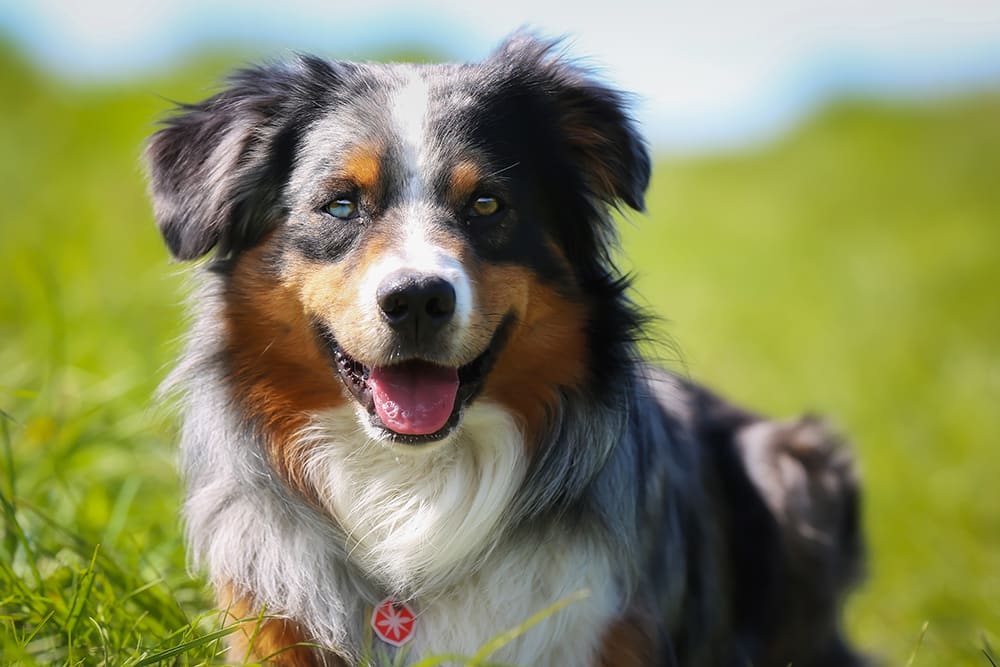Why do dogs eat grass?
If your dog eats grass you may be worried and confused about this strange behavior. In some cases, our four-legged friends will even eat grass, vomit, then go right back to eating grass.
Many pet parents ask us whether this behavior is safe and whether it's an indication that their dog feels that something in their stomach needs to be brought up?
Although some dogs will vomit after eating grass, this isn't the case for all dogs and so it seems unlikely that they are trying to induce vomiting. Below are a few of the more common reasons why your dog may enjoy eating grass.
Could there be a physical reason why your dog eats grass?
Most dogs eat grass without displaying any signs or symptoms of stomach awesome. So, it seems unlikely that dogs would eat grass to induce vomiting. That said, physical reasons can include a lack of fiber in their diets. Because dogs are omnivores, their good health depends on plant foods in addition to high-quality meat. Fiber is needed to help keep their digestive system running smoothly, and eating a few blades of grass may be an easy way for your pup to get some roughage in their diet.
That said, if your dog is eating grass and showing signs of stomach upset, your pooch may have a medical problem. Dogs can be afflicted with numerous gastrointestinal issues such as inflammatory bowel disease or pancreatitis. If your dog is eating grass and exhibits other symptoms such as decreased energy, constipation, diarrhea or lack of appetite, we recommend booking an examination with your vet.
Is there a psychological reason why your dog is eating grass?
Dogs often eat grass due to anxiety or boredom, in much the same way that pet parents will bite their nails. If your dog does not have any other symptoms of digestive issues but frequently munches on grass, the reasons for their behavior may be psychological.
If your dog could simply be suffering from boredom, increasing the length, distance or intensity of walks could help to reduce grass eating.
Separation anxiety could also be the reason that your dog is eating grass. Try leaving an old blanket or t-shirt with your scent on it with your dog when you leave the house. Your dog may find the familiar scent reassuring and help to curb their grass-eating habit.
Some dogs show obsessive behaviors. If your dog is obsessively eating grass, your vet will be able to advise you on how to help your pup reduce obsessive behaviors.
Is it safe for dogs to eat grass?
In most cases, provided that your dog is otherwise healthy and on a regular schedule of parasite prevention medication, eating grass is considered to be a safe behavior.
One important thing to note is that, in order to help keep your grass nibbling pooch healthy, be sure that there are no herbicides, pesticides or fertilizers on the grass your dog enjoys.
Note: The advice provided in this post is intended for informational purposes and does not constitute medical advice regarding pets. For an accurate diagnosis of your pet's condition, please make an appointment with your vet.
Are you concerned about the extent of your dog's grass eating habit? Contact Animal Hospital of Clemmons today to book an examination for your four-legged family member.
Looking for a vet in
Clemmons?
We're always accepting new patients, so contact our veterinary hospital today to book your pet's first appointment.
Related Articles View All
Grooming Anxiety in Dogs - Tips to Calm Your Anxious Dog
Does your dog become anxious and scared when it comes to grooming time? Here, you will find helpful tips to soothe your dog's nerves and make a trip to the groomer a happy adventure.
Checklist for a Successful First Vet Visit for Your Puppy
It's your puppy's first vet visit. What do you need to bring? What happens at a puppy appointment? Today, we provide tips to help make your puppy's first vet visit successful.
What to Do About Diarrhea in Dogs
Dog diarrhea is a messy problem most pet parents find themselves dealing with at some point. So, what causes diarrhea in dogs and how can you stop it? Read on to find out.
My dog's ear is bleeding! Why? What should I do?
In today's post, you will learn about some common causes of bleeding ears in dogs, other symptoms that may occur along with ear bleeding and when a visit to the vet is required.
Caring for a Dog With a Broken Jaw
You may be surprised to learn that broken jaws are alarmingly common in dogs. Here, you will learn about the causes of a broken jaw in dogs, how they can be repaired, and advice on caring for your pup as their jaw heals.

